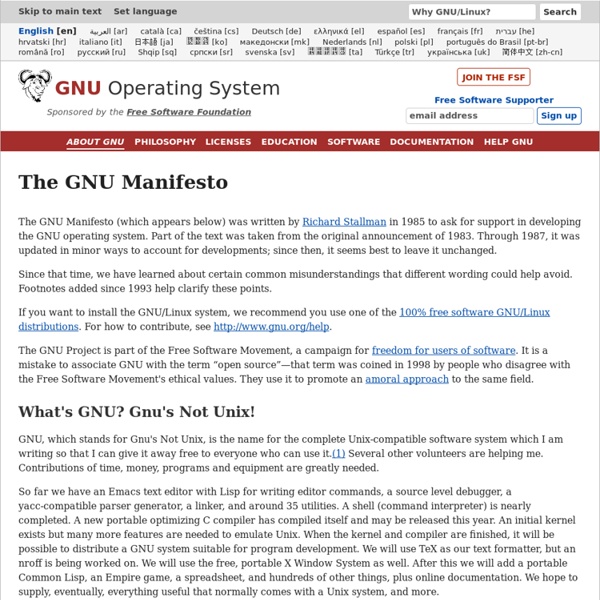



http://www.gnu.org/gnu/manifesto.html
Le Manifeste GNU L'original de cette page est en anglais. Le manifeste GNU, reproduit ci-dessous, a été écrit par Richard Stallman au commencement du projet GNU pour recruter des participants et demander un soutien matériel. Au cours des premières années, il y a eu quelques petites mises à jour pour tenir compte de l'évolution du projet, mais il nous semble maintenant plus judicieux de le laisser dans l'état où la plupart de ses lecteurs l'ont vu. Nous avons appris depuis que certains passages étaient souvent mal interprétés ; ceci peut être corrigé en changeant quelques mots. Des notes ajoutées depuis 1993 aident à clarifier ces points. Qu'est-ce que le copyleft ? - Projet GNU - Free Software Foundation (FSF) [Traduit de l'anglais] Le copyleft est une méthode générale pour rendre libre un programme (ou toute autre œuvre) et obliger toutes les versions modifiées ou étendues de ce programme à être libres également. La manière la plus simple de faire d'un programme un logiciel libre est de le mettre dans le domaine public, sans copyright.1 Cela autorise les gens à le partager si le cœur leur en dit, avec leurs améliorations éventuelles. Mais cela autorise aussi des personnes indélicates à en faire un logiciel privateur.2 Elles peuvent très bien y effectuer des changements, nombreux ou non, et distribuer le résultat en tant que logiciel privateur. Ceux qui recevront le programme dans sa forme modifiée n'auront pas la liberté que l'auteur original leur avait donnée ; l'intermédiaire l'aura fait disparaître.
Free Software Foundation Un article de Wikipédia, l'encyclopédie libre. Pour les articles homonymes, voir FSF. La FSF aide également au financement du projet GNU depuis l'origine. Une vid?o canon sur le logiciel libre La vidéo est à télécharger (5 min - 42 Mo) au format OGG à ou ci-dessous : Téléchargez la séquence vidéo Les logiciels libres et l’Éducation - Une conférence de Jean-Pierre Archambault - Éducation Professeur agrégé de mathématiques, Jean-Pierre Archambault est chargé de mission veille technologique au CNDP-CRDP de Paris, où il assure notamment la responsabilité du dossier des logiciels libres, coordonnant le pôle de compétences logiciels libres du SCEREN. C’est à ce titre qu’il a été invité à parrainer la Journée Logiciels Libres pour l’Éducation 2005, organisée par l’association Graoulug, l’université Paul Verlaine - Metz et l’IUT de Metz, qui a eu lieu le mercredi 16 mars 2005 à l’IUT de Metz. À cette occasion, il a donné une conférence sur le thème :"Les logiciels libres et l’Éducation". Il y aborde toute une série de questions et d’enjeux essentiels liés au développement du logiciel libre ; cela va de sa définition, la viabilité de son modèle économique, son intérêt pour l’éducation en particulier mais aussi pour le secteur de l’informatique en général.
Francis Muguet Un article de Wikipédia, l'encyclopédie libre. Francis Muguet Francis Muguet (né le et mort le 14 octobre 2009[1]) était un chercheur français et une personnalité de l'Internet. Biographie[modifier | modifier le code] Docteur en sciences de l'Université de Texas Tech (1992, thèse sur des améliorations computationnelles concernant un nouveau modèle de l'électron hydraté ainsi que des géométries de dimères de l'eau et de l'ammoniac) et licencié en droit, il fut chercheur à l'École nationale supérieure de techniques avancées (ENSTA ParisTech) de 1993 à 2009, puis consultant auprès de l'Union internationale des télécommunications (UIT) et l'Université de Genève. Engagements[modifier | modifier le code]
Creative Commons : Soyons créatifs ensemble - Free Culture La photo est issue du concert donnée à New-York le 21 septembre 2004 au bénéfice des licences Creative Commons (avec en particulier David Byrne et Gilberto Gil). Elle est l’oeuvre de Kathryn et est sous licence cc (by-nc-sa). Nota (27 mai 2004) : petite mise à Jour de l’article pour tenir compte des nouvelles fonctionnalités des licences Creative Commons avec la sortie de la version 2.0. Logiciel libre Un article de Wikipédia, l'encyclopédie libre. Logo du projet GNU, initiateur du mouvement du logiciel libre. Un logiciel libre est un logiciel dont l'utilisation, l'étude, la modification et la duplication en vue de sa diffusion sont permises, techniquement et légalement[1]. Ceci afin de garantir certaines libertés induites, dont le contrôle du programme par l'utilisateur et la possibilité de partage entre individus[2].
Richard Stallman en grande forme (conférence à l'ENST le 3 avril 2007) Que ce soit en direct dans la salle ou en différé sur le net, je commence à avoir pas mal de conférences générales sur le logiciel libre de Richard Stallman au compteur. Il faut dire que le bonhomme pour apprécier la France y revient souvent et s’exprime dans un français plus que correct (espèce étrangère en voie de disparition ?). A priori on a l’impression d’assister toujours à la même conférence. Et celle que nous vous présentons en vidéo ci-dessous donnée mardi 3 avril 2007 dernier à l’ENST (École nationale supérieure des télécommunications) n’échappe à la règle. Chaussures ôtées et plus beau tee-shirt exhibé, on se retrouve invariablement avec la même entame (dont je ne me lasse toujours pas) : « Je puis expliquer le logiciel libre en trois mots : liberté, égalité, fraternité… » (sous vos applaudissements). Idem pour la conclusion du reste (dont je commence à me lasser) : « …J’ai des autocollants, des pins et des porte-clé à vendre ».